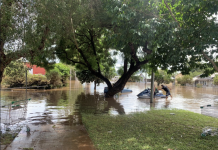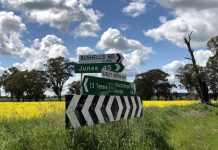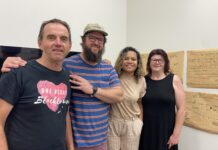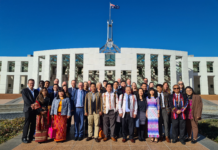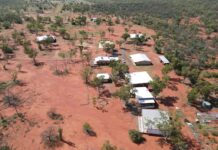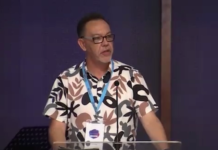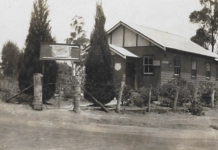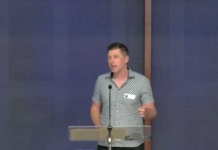
I recently joined the team at the Baptist Association to help our movement work out how we can best engage with our society. In our current cultural context we, as Christians, increasingly find ourselves being pushed to the margins of culture. Many remember a time when the voice of the church was valued. Yet today we find ourselves in a position where the audience (Australians) seem disinterested in what we have to say.
As I reflect on this reality, I’m reminded of an experience I’ve had recently. It’s the end of the day and I sit down to relax in front of the television. I pick up the remote control, turn it on, but there’s no sound. I press the volume button… still no sound. I press it again… still no sound. I realise the mute is turned on so I press the unmute button and a sudden, ear piercing roar booms from the speakers. It’s loud. The kind of loud that makes your wife run panicking into the room. The kind of loud that wakes your 3 small children. It sounds, for a moment, as if the stereo is actually going to blow into tiny pieces.
Our natural human response when people aren’t listening to us is to shout louder. It seems to me that this is also the approach that we are taking with the gospel as we realise that people are not listening. We know people need to hear so we shout louder. But the problem is that the mute button is on, or worse still, the TV is completely switched off. Many Australians now have absolutely no contact with a Christian person, let alone with a church. If the TV is turned off it doesn’t matter how much we turn up the volume. We need to find ways to get people to turn on the TV so they can hear the life changing truth of the grace of Jesus.
And when people do have opportunity to hear the gospel, we don’t want them to feel like we’re shouting at them!
It seems to me that our engagement with society should result in people turning on the TV. There should be something distinctive about the way God’s people relate to each other and the world that makes people ask why.
Let me give an example of what I mean. Some caucasian friends of mine have three children of their own. In recent years they have taken some children from an African background into their family through long term foster care. When they go to the supermarket with their caucasian children nobody notices them, but whenever they go to the supermarket with the whole family, they get noticed. People are intrigued and they often get asked to explain their story. Because their family is different, they challenge people’s assumptions about what a family should be, and people are interested to understand why.
Similarly, when we live differently in a culture where Jesus’ way of life is increasingly foreign, we challenge people’s assumptions about the best way to live. People will be interested to understand who we are learning life from.
 One of the things I have enjoyed doing since starting in this role is reading amazing stories from previous editions of Together magazine.
One of the things I have enjoyed doing since starting in this role is reading amazing stories from previous editions of Together magazine.
There are stories of Baptists supporting work in Kenya through Baptist World Aid to help local farmers reduce soil erosion, leading to significant improvements in their crop yield. There are stories of local church communities writing letters to our Treasurer highlighting how unfair it is that large multinational companies avoid paying tax in Australia while those same companies enjoy the services provided by the tax dollars of average Australians. There are stories of local churches working in partnership with Baptist Care to address issues of substance abuse in their communities.
The idea of public engagement on important issues can seem daunting because the issues are complex and the problems are big. However, when we step back and take a look at the full picture of what we as an Association of Baptist churches are doing in communities across this state, then a beautiful mosaic of stories starts to emerge. Together, we are having an influence.
We’re in the process of gathering together a public engagement working group to help carry this work forward. The group will seek to take a bird’s eye view of what is happening across the Association. We’ll be seeking to tell stories, to connect people together, to provide opportunities for collective action. We’ll also be seeking to communicate with leaders, the people who have the power to make decisions that will significantly benefit the poor and marginalised.
I believe the church has a magnificent opportunity to stand in the gap. We need to learn to be as comfortable sitting with the marginalised and the weak in our society as we are sitting in the offices of our nation’s leaders.
We have something to say to people in power because we have stories to tell about our engagement in the lives of individuals and communities. We are people who serve and who care. We are people who share life with their neighbours. We are people who listen. We are people who understand the real issues that communities, families and individuals are facing.
As we start down the path of a fresh effort to influence our society, it is important to reflect on why we do it.
Our primary reason for engaging should not be to protect ourselves or our way of life. When we engage society because we fear change, we are perceived as selfish and defensive. We need to be seeking the flourishing of others, not just protecting our own interests.
Our primary reason should not be to make everyone like us. While we seek to influence society in line with God’s purposes for the world, we need to remember that God’s glory is not dependent on people living a certain way.
I think our primary reason for engaging is faithfulness. God has changed our lives through his grace in Jesus and we now live out the reality of that change. We engage because our king calls us to live a different way. And when people see us living that way, we trust that many are going to see something of the fullness of life that God intends all people to enjoy.
We would love for you to join us as we seek to show people what a world aligned with the king and his kingdom might look like.


